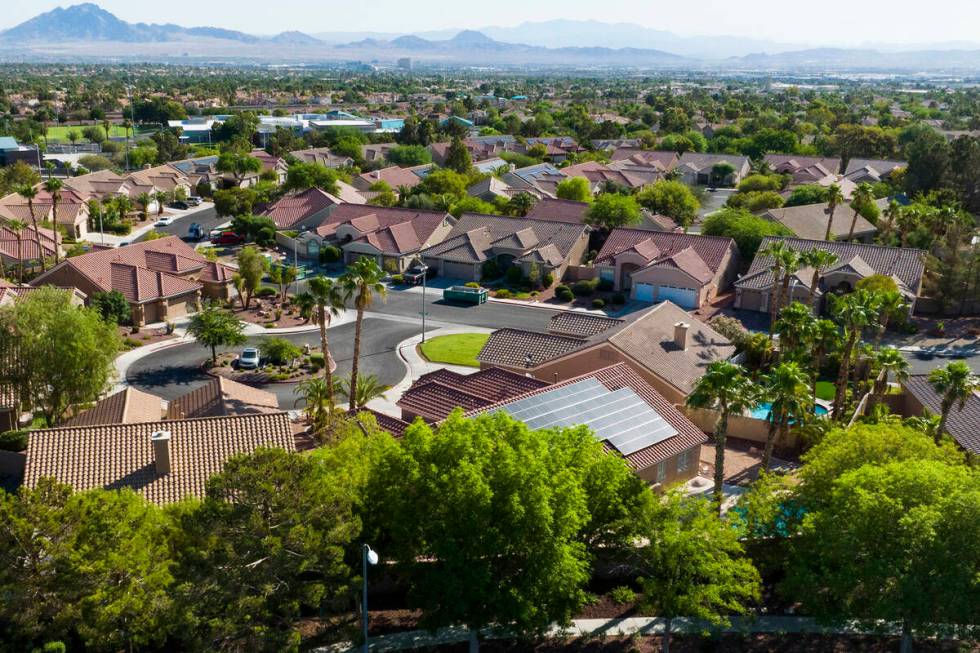Las Vegas home listings drop by more than half, report shows

New home listings in the valley dropped nearly 52 percent in July from a year earlier, according to new data from Las Vegas Realtors.
This historically low inventory of houses for sale, combined with higher mortgage rates and other factors, have created a unique housing market in Las Vegas, said Steve Hawks, a real estate agent with Platinum Real Estate, who has more than 20 years of experience in the market.
Las Vegas Realtors reported 3,524 single-family homes listed for sale in the valley without any sort of offer in July, a 4.2 percent drop from June but a 51.9 percent drop from the same time last year. However, Las Vegas was the only metropolitan area in the United States that saw a bump in pending home sales over the past month, according to new data from online real estate brokerage Redfin.
Additionally, a recent Redfin report shows Las Vegas had the country’s largest drop in new listings over the past four weeks, at 43.4 percent. The metropolitan area also had the fourth-largest decline in home sale prices over that period (3.5 percent).
The median list price for a single-family house in the valley in July dropped 0.1 percent from June to $499,173, which is essentially the same median price for a house this time last year.
Hawks said the local inventory is at a historical low for several reasons, including the Federal Housing Administration’s forbearance program instituted during the COVID-19 pandemic, which allowed some homeowners to pause or reduce mortgage payments.
“In Las Vegas, thousands of forbearances have allowed homeowners to take their house off the market or not put their house on the market,” he said. “Instead they’re doing a forbearance where they don’t have to make a mortgage payment for say six, eight, 12 or 18 months. The FHA made forbearances mandatory for servicers last April.”
Plus, he said, low inventory has combined with rising interest rates to create a perfect storm in the valley housing market.
The federal funds rate — the interest rate that financial institutions charge each other for overnight loans — currently sits at 5.25-5.5 percent. According to Freddie Mac, the average rate for a 30-year fixed mortgage is just under 7 percent — numbers the U.S. economy has not seen since the 2008-09 economic downturn.
Opting to rent out instead of sell
According to Redfin, “housing payments remain historically high because mortgage rates remain elevated” and the median home-sale price nationally is up 3.2 percent year over year, which is the biggest increase since November.
“So many people have low interest rates between 2 and 3.5 percent, it doesn’t make sense to sell your home and move up or move down when your rates are going to be 6 or 7 percent,” Hawks said. “What many sellers are doing is they are buying another house and they’re keeping the house they live in and renting that out. In the past they would most always sell and buy. Now it’s rent and buy.”
Homeowners are using that extra cash flow to subsidize the payments on the new house, he said. “It’s ironic somebody can rent out their old house and have a renter pay off their old house and help them pay off their new house.”
Hawks said government intervention has affected the U.S. housing market when it comes to interest rates and a number of other measures, and not for the better.
“The Fed has really caused chaos in the real estate market,” he said. “Then you add the government programs like the forbearances and ERC (Employee Retention Credit), which is pumping more money into the economy and keeping inventory low for the foreseeable future.”
New players coming into the market have caused an imbalance as well, according to Hawks. Investors and companies buying real estate is nothing new to the city, as reports as far back as the start of the pandemic note the emerging trend due to historically low interest rates.
Hawks said this is hurting average buyers.
“Another major reason (for the unaffordable marketplace) is hedge funds own tens of thousands of starter homes in Las Vegas. Those homes are never coming on the market, making inventory in homes under $500,000 scarce forever. It’s very sad that entry-level homes have been wiped out by these cash rich Wall Street landlords. They have destroyed the American dream for many as they are forced to rent from Wall Street landlords.”
Contact Patrick Blennerhassett at pblennerhassett@reviewjournal.com.